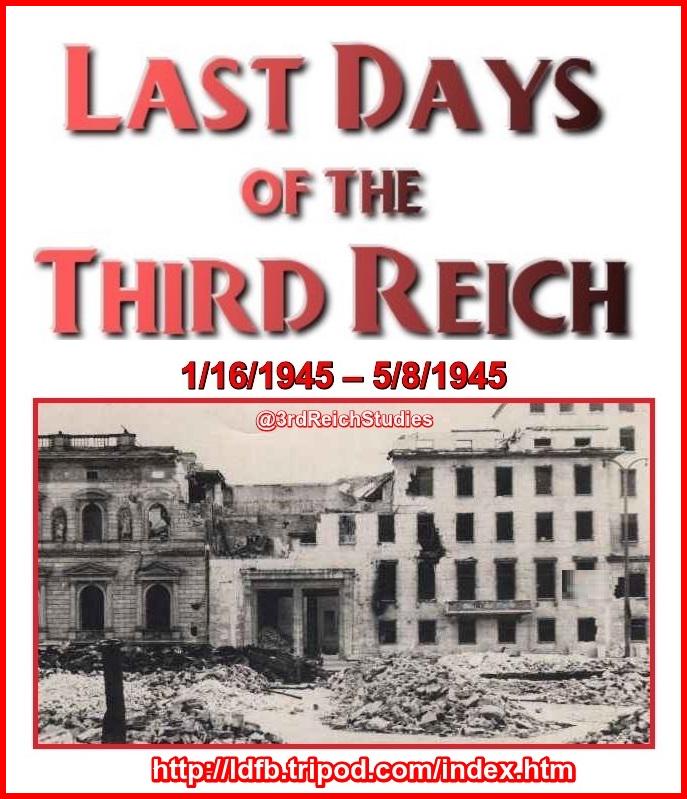 Copyright © 2011-2013
Walther Johann von Löpp
All Rights Reserved
Copyright © 2011-2013
Walther Johann von Löpp
All Rights Reserved
 Twitter: @3rdReichStudies
FB: Horrific 20th Century History
Twitter: @3rdReichStudies
FB: Horrific 20th Century History




The Propagander ™ FAQ
What Was The Mediterranean Strategy?
Dr Stahmer: When were you first informed that Hitler thought a war against Russia necessary?
Goering: It was not until the late fall of 1940, in Berchtesgaden, that I was informed about the intentions of the Fuehrer to enter into, conflict with Russia under certain circumstances.
Dr Stahmer: Were you present at the conversation, which took place in Berlin in November 1940 with the Russian Foreign Minister, Molotov?
Goering: I personally was not present at the conversation between Hitler and Molotov. Mr. Molotov, however, also paid me a visit, and we discussed the general situation. I know, of course, about the conversation with Molotov, because the Fuehrer informed me about it in detail. It was just this conversation which very much increased the Fuehrer's suspicion that Russia was getting ready for an attack upon Germany, and this was brought out during this discussion by the remarks and demands which Mr. Molotov made.
These were, firstly, a guarantee to Bulgaria, and a pact of assistance with Bulgaria, such as Russia had made with the three Baltic states.
Secondly, it involved the complete abandonment of Finland by Germany, to such an extent that Russia, who had signed a peace with Finland a short time ago, thought herself justified in attacking Finland again in order not to have to acquiesce in the results of the previous agreements, Hango, et cetera.
Thirdly, it dealt with discussions about the Dardanelles and the Bosporus; and the fourth point was the possibility of penetration into Romania beyond Bessarabia. These were the points which were discussed with the Fuehrer. There was also a hint to the Foreign Minister about an occupation, or securing of interests, at the exit of the Baltic.
The Fuehrer viewed these demands in a different light. Although Russia might have been justified in making demands to Germany concerning Finland, he believed, that in connection with other reports which he had received about Russian preparations and deployment of troops, Russia wanted to strengthen her position in Finland, in order to outflank Germany in the north and to be in immediate proximity to the Swedish ore mines, which were of vital or at least very decisive importance to Germany in this war.
Secondly, as to the advance, as demanded, into the Romanian and Bulgarian area, the Fuehrer was not at all sure that this pressure would continue in the south, that is, the Dardanelles, or in a near-easterly direction, but rather in a westerly direction; that is to say, that here also Russia might push into the southern flank of Germany and, by getting control of the Romanian oil fields, make Germany absolutely dependent on Russia for deliveries of oil. In these demands he saw the camouflaged attempts to deploy troops and obtain troop positions against Germany. The suggestion of securing an outlet to the Baltic did not even come up for discussion, as far as Germany was concerned, at that time.
Altogether that conversation caused the Fuehrer to feel that further relations were being menaced by Russia. Already in his discussion with me the Fuehrer told me why he was thinking about anticipating the Russian drive under certain circumstances. The information about feverish work on deployment preparations in the area newly acquired by Russia, Poland, Lithuania, Latvia, Estonia, and Bessarabia, made him extremely suspicious. Until then we had sometimes only 8, later 20 and 25 divisions along the entire eastern border. Further reports came that Russia might be expected to attack us from the rear as soon as Germany had gone to war in the West, either because of an invasion by Britain or because Germany on her part had decided to invade England. His arguments were strengthened even more by the fact that shortly before, contrary to anything practiced in Russia before this, engineers, and, I believe, also officers of ours, that is, Germans, were suddenly shown the tremendous Russian armament works of the aviation and tank industry (1).
These reports about the surprisingly high production capacity of these armament works further strengthened the Fuehrer's conviction. He was so firmly convinced because, he said--and this was his political reflection--if England still will not consider coming to an agreement with us, although she now stands alone against us, she must have something at the back of her mind. He had information that Prime Minister Churchill had pointed out two things to worried elements in England. First, that increased support by the United States could be expected, first of all in the technical field, that is, with respect to armaments, and then extending to other fields; and, secondly, which he considered even more probable, that Churchill had already come to an understanding with Russia (2) in that direction, and he pointed out that here sooner or later there would be a clash.
His calculations were the following: Before the United States could be ready with her armaments and the mobilization of her army, he would have to smash the Russian troop concentrations, and break down and weaken the Russian forces to such an extent by strong concentrated attacks, that they would not represent a danger in the rear if he had to enter into an English-American conflict on the Continent. These were the explanations of the Fuehrer. Then came the visit of Molotov, which I just mentioned and which enhanced this point of view considerably.
Dr Stahmer: What was your attitude toward an attack on Russia at that time?
Goering: At first I was very much surprised at the time and asked the Fuehrer to give me a few hours to state my view. It came entirely as a surprise to me. Then in the evening, after this conversation had taken place in the afternoon, I told the Fuehrer the following: I urged him most particularly not to start a war against Russia at that moment, or even a short time after; not that I was moved by considerations of international law or similar reasons; my point of view was decided by political and military reasons only.
First, at all times since the seizure of power I, perhaps of all the leading men in Germany, was the only one who always considered conflict with Russia as a threatening menace to Germany. I knew--and many others with me--that for over 10 years an exceedingly strong rearmament and training program had been in effect in Russia, that the standard of living had been lowered in all other fields in favor of one single tremendous rearmament. The deliveries made by German industry and examination of the deliveries made by the American, British, and other industries always showed clearly that they consisted only of such machines as were directly or immediately necessary for a gigantic industrial rearmament program. One could thereby estimate the speed and the size of the Russian rearmament.
If Germany had now developed in the way of communism, then of course the Russian rearmament, in my opinion, would have been directed against other danger. But since we had come to power, the inner political and ideological contrast naturally played, in my opinion, a menacing part. I have come to understand that such contrasts do not necessarily have to lead to conflicts between countries, because the political interests of nation and state will always be stronger and greater than all ideological contrasts or agreements. But here also I saw a menace, because what did this tremendous Russian rearmament signify at a time when Germany before the seizure of power, was impotent? I now told the Fuehrer that in spite of this basic attitude I always feared this danger from Russia and had always recognized it, but that I was asking him rather to leave this danger in abeyance and, if at all possible, to direct Russia's interests against England.
And indeed I said to him: "'We are at present fighting against one of the greatest world powers, the British Empire. If you, my Fuehrer, are not of exactly the same opinion, then I have to contradict you, because I am definitely of the opinion that sooner or later the second great world power, the United States, will march against us. This will not depend on the election of President Roosevelt; the other candidate will also not be able to prevent this. Then we shall be at war against two of the largest world powers. It was your masterstroke at the beginning of the war to make possible a one-front war; you have always pointed that out in your Kampf. In the case of a clash with Russia at this time, the third great world power would be thrown into the struggle against Germany. We would again stand alone, against practically the entire world; the other nations do not count. And again we would have two fronts."
And he replied, "I fully appreciate your arguments. I appreciate the Russian menace more than anybody else, but if we should succeed in executing our plans as prepared in the fight against the British Empire, and if these were only half-way successful, Russia would not launch her attack. Only if we should become deeply involved in a serious conflict in the West would I be of your opinion, that the Russian menace would increase enormously."
I was even of the opinion that the quick assent of the Russians to the settlement of the Polish crisis was given in order that Germany, free from that side, would be all the more likely to get into this conflict, because the German-French-British conflict would come about thereby, and it would be entirely understandable, as far as Russian interests were concerned, to bring about this conflict and come out of it as well as before. I furthermore told the Fuehrer that, according to my reports and evidence, Russian rearmament would reach its climax in the year 1942-43, or perhaps even in 1944. Before then we should, however, succeed, if not in achieving a peace by victory on our part, at least in coming to an arrangement with England. This, however, would be possible only if decisive successes were achieved against England.
At that time the German Air Force with all its weight was being employed in the attack on England. If now a new front should be formed for an attack on Russia, a considerable part of these air forces, more than half, two-thirds, would have to be diverted to the East. For practical purposes an energetic air attack on England would thereby cease. All the sacrifices up to that time would be in vain; England would be given a chance to reorganize and build up her shattered aircraft industry undisturbed (3).
Much more decisive than these considerations was the fact that with a deployment of that kind against Russia, my plan, which I had submitted to the Fuehrer, to attack England at Gibraltar and Suez, would have to be dropped more or less finally. The attack on Gibraltar was so methodically prepared by the Air Force that, according to all human expectations, there could be no failure. The British air force stationed there on the small airfield north of the Rock of Gibraltar was of no importance. The attack of my paratroopers on the Rock would have been a success.
The simultaneous occupation of the other side, the African side, and a subsequent march on Casablanca and Dakar would at least have been a safeguard against America's intervention--a campaign, such as later took place in North Africa. To what extent beyond this, by agreement, the Cape Verde Islands could still be used, was an open question. It is obvious what it would have meant to be established with aircraft and submarines at North African bases and to attack all the convoys coming up from Capetown and South America from such favorable positions. Even if the Mediterranean had been closed in the west, it would not have been difficult, by pushing across Tripoli, to bring the Suez project to a conclusion, the time and success of which could be calculated in advance.
The exclusion of the Mediterranean as a theater of war, the key point Gibraltar--North Africa down to Dakar--Suez, and possibly extended further south, would have required only a few forces, a number of divisions on the one side and a number of divisions on the other, to eliminate the entire insecurity of the long Italian coast line against the possibility of attack. I urged him to put these decisive considerations in the foreground and only after the conclusion of such an undertaking to examine further the military and political situation with regard to Russia. For, if these conditions were brought about, we would be in a favorable position (4) in the case of an intervention by the United States, a flanking position.
I explained to him all these reasons in great detail and pointed out to him again and again that here we would be giving up something relatively secure for something still insecure, and that, after securing such a position, there would be much more of a prospect of coming, under certain circumstances, to an arrangement with England at a time when the two, both armed, would be standing opposite each other, the one on this, the other on that side of the Channel. These were my reasons for delaying the date, and I also told him that increased successes in this direction might enable us to steer Russian preparations politically, where possible, into other channels, against our enemies of the moment. I emphasize, however, that the Fuehrer, restrained by considerations of caution, at first made only general preparations and was going to hold in reserve, as he told me at the time, the actual attack; and the final decision was not taken until after the Simovic revolt in Yugoslavia.
Copyright © 2011-2013 Walther Johann von Löpp All Rights Reserved
Twitter: @3rdReichStudies FB: Horrific 20th Century History




Featured Sites:Austria: The Other GermanyThe Last Days of the Third ReichAdolf Hitler: The First Super-VillianThird Reich History: What Happened Today?Countdown to Infamy: Timeline to Pearl HarborBiographical Timeline: of the Infamous Adolf HitlerCountdown To WW2: August 22 - September 1, 1939The Nuremberg Nazis: Detailed, Documented BiographiesWunderwaffen: Hitler's Deception and the History of RocketryMain Sites:
Adolf Hitler: The VolkswagenAdolf Hitler: The Fuehrer's MercedesAdolf Hitler: Mein Kampf ExaminedIn the Shadow of Frederick the GreatHitler's Battleship: Sink The Bismarck!Non-Fiction Comics: Military PeriodicalsHistory of Olympic Boycotts: From Berlin to BeijingHogan's Jews: 5 Cast Members Were Jews; Their Stories



















Disclaimer: The Propagander!™ includes diverse and controversial materials--such as excerpts from the writings of racists and anti-Semites--so that its readers can learn the nature and extent of hate and anti-Semitic discourse. It is our sincere belief that only the informed citizen can prevail over the ignorance of Racialist "thought." Far from approving these writings, The Propagander!™ condemns racism in all of its forms and manifestations.
Fair Use Notice: The Propagander!™may contain copyrighted material the use of which has not always been specifically authorized by the copyright owner. We are making such material available in our efforts to advance understanding of historical, political, human rights, economic, democracy, scientific, environmental, and social justice issues, etc. We believe this constitutes a "fair use" of any such copyrighted material as provided for in section 107 of the US Copyright Law. In accordance with Title 17 U.S.C. Section 107, the material on this site is distributed without profit to those who have expressed a prior interest in receiving the included information for research and educational purposes. If you wish to use copyrighted material from this site for purposes of your own that go beyond 'fair use', you must obtain permission from the copyright owner.
